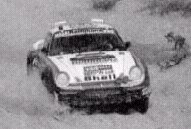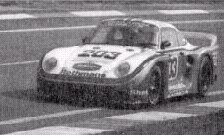Paris-Dakar rally
 959 was designed to comply with
FIA Group B regulations. In theory, it could compete with other Group B
rally cars like Audi Quattro Sport, Lancia Delta S4 and Peugeot 205 T16
in the World Rally Championship, which was the most exciting and most sophisticated
rally category ever appeared. However, Porsche did not do that, it just
entered 959 in the less competitive Paris-Dakar rally. Why ?
959 was designed to comply with
FIA Group B regulations. In theory, it could compete with other Group B
rally cars like Audi Quattro Sport, Lancia Delta S4 and Peugeot 205 T16
in the World Rally Championship, which was the most exciting and most sophisticated
rally category ever appeared. However, Porsche did not do that, it just
entered 959 in the less competitive Paris-Dakar rally. Why ?
Compare with those fabulous Group B rally cars, 959 was obviously too heavy and too big. For example, the Delta S4 weighed just 890 kg, powered by a 1.7-litre turbocharged plus supercharged engine capable of 470 hp in racing trim. The 959, governed by the regulation which according to engine capacity, could not be lighter than 1,100 kg. In fact, it could be heavier. How could 959 compete with them ? Money was another problem. A whole season of WRC might cost dozens of million, which was not affordable by a car maker producing 50,000 cars annually.
Porsche chose the Paris-Dakar, very clever. It was the most famous event in the world, but competition was far less than WRC - Mercedes G-Wagen, Mitsubishi Pajero, Opel Manta .... these were what the 959 faced in 1985 and 86 !! Porsche had every reason to win: more money than most rivals, most expensive car in the field, most powerful and 4-wheel drive. On the contrary, its rivals had every reason not to win: none of them were Group B car !!
Therefore, Porsche cleverly used this event for advertising purpose, and simultaneously wanted to test the reliability of 959 in the worst conditions. In 1984, Porsche entered several 911 Carrera 4x4, which were development cars for 959's 4WD system, although without the variable torque split function. They finished 1st, 2nd and 26th. Easy job.
In 1985, they entered three 959s development cars, with 100% 959 appearance, but instead of the twin-turbo engine, they were powered by 911 Carrera's 3.2-litre normally aspirated engine with 230 hp only. The 4WD system and suspensions were the same as the eventual 959. However, all three cars retired by mechanical problems.
Next year, the cars were almost identical to the production model. Like 959 Sport, no ride height adjustment in the suspensions, so ground clearance was increased. The twin-turbo engine was detuned to "only" 400 hp to drink the inferior fuel available in Africa. This time they refreshed all the unhappy memory by winning 1st, 2nd and 5th place. If the third car did not act as a service car (it picked the spare tyres, and repairment kits for the other two), it could have finished 3rd !!
Le Mans - 961
 At
least the rally 959 won Paris-Dakar. The track version, now called 961,
won only a category victory.
At
least the rally 959 won Paris-Dakar. The track version, now called 961,
won only a category victory.
Since its introduction in 1982 until its cancellation in 1986, Group B category was never successfully expanded outside rallying. FIA had a "Group B evolution" regulation for endurance racing which allowed some degree of modifications to the 200-off production model by only making 30 such cars. However, Porsche did not do that because, actually, no other car makers were doing that. Instead, according to the loosely IMSA GTX regulation which had no production requirement, Porche created several 961 based on 959, and entered them in Le Mans 24 hours only.
961 would have been a successful racing car if it were given suitable regulation. Remember we said the 959 engine was developed from Porsche 956 / 962's Group C endurance racing cars ? With a little more work to restore the original nature, 961 can easily output 680 hp while running at 1.4 bar boost pressure (versus 959's 0.9 bar). The turbochargers returned to parellel arrangement like the Group C engine. Brakes came from 962. The 4-wheel drive was retained but was set to heavily rear-biased (20 / 80). No adjustable damping and ride height like the 959 Sport. The body was thoroughly lightened so that kerb weight was reduced to only 1,150 kg. Bigger rear wing and revised air dam reflected the needs of track racing.
In the first try in 1986 Le Mans 24 hours, the 959 ran smoothly and finished 7th overall, or 1st place in IMSA GTX category. All the cars in front of it were Group C cars, so the result was quite respectable. However, in those days Group C was the majority and the highlight of endurance racing. The IMSA GTX did not attract much attention from car makers as well as spectators, so 961 did not really proved its superiority.
It was only raced once more, in 1987 Le Mans it retired following an accident. More disappointingly, lap time and maximum speed were slightly inferior to those obtained at its first attempt.
Anyway, 959 did proved itself as a versatile car - no other car in modern history, except Porsche 911, won rally race as well as endurance race.